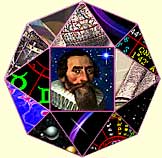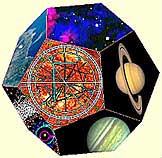Don't believe in astrology?
I don't blame you. Your exposure to astrology is probably Sun Sign columns in your local newspaper. If the only physicians that I was familiar with diagnosed illness by measuring the size of a person's head, I would have a low opinion of medicine. Unfortunately, astrology is a very unregulated area of study, and a lot of extraordinarily simple-minded ideas get passed off as astrology.
Astrology has been practiced for thousands of years, and it appears to many people that astrology is a manifestation of the human mind's first attempts to explain events in the world by association rather than causal relationships. In other words, non-technological cultures often explain events by the action of gods or coincidental events and omens. The same myth-making part of the brain that created Greek, Norse, Hindu, Chinese, native American, African, or any other cultures myths, seems to have conjured up the myths of astrology.
So it seems obvious that astrology is just hocus-pocus, the remnants of our ancestors from a time before modern scientific and technological advances, a mere vestige of our ancient past that continues to live on in modern times in the deluded minds of people even today.
Although it may seem obvious, as explained above, that astrology is a superstition, anyone who studies astrology seriously will be shocked to discover that there is validity to astrology. Now, let's address several common questions about astrology in a question-and-answer format:
Questions - Answers

Question: How does astrology work?
Answer: There are many theories but no proofs. The fact is that we do not know how astrology works.
Question: If you don't know how astrology works, then doesn't that prove that astrology is not scientific. Science is based on theories, right?
Answer: Wrong! Science is based on observation. More specifically, science is based on the scientific method. Theories are extremely important in science because theories help the scientist make predictions of how things will behave in a new context. Without theories, science would proceed at an incredibly slow pace. But one can make clear, indisputable observations without any theory at all. For example, I can predict that any heavy object dropped from a table will fall to the ground. The fact that heavy objects fall to the ground was true before Newton discovered the laws of gravity. The laws of gravity, however, expand our understanding of how gravity works and allow us to predict the movement of celestial objects and of astronauts in space, for example. Theories enable us to synthesize seemingy unrelated facts into a coherent paradigm, and enable us to make other predictions and discoveries. Theories are critically important, but a theory can change without affecting the validity of an observation. Before Sir Isaac Newton discovered the laws of gravity, one could still predict that an apple will fall out of a tree and hit the ground rather than fly out into space, and you do not need to master physics to know that apples fall to the ground.
Question: But astrology just doesn't make any common sense at all. There is no magnetic or gravitational force or any other explanation for why planets should affect humans, and the theories of astrology just don't make common sense, they seem more superstitious. How can astrology be considered a science?
Answer: Lots of theories in physics don't make common sense either. Albert Einstein and other 20th century physicists have proposed all kinds of absurd and seemingly ridiculous ideas such as space is curved (so therefore the fastest way to get to distant galaxies is a curved path rather than a straight line!), that time is really a fourth dimension, and not separate from space, that looking at something alters its position, that subatomic particles move so fast that time is experienced differently for these particles; time can speed up or slow down as the speed of an object changes! Now these ideas don't make common sense, and sound like the stuff of science fiction, but they are taken seriously by physicists not as science fiction but as valid and serious scientific theories. In short, it is not necessary for an idea to make common sense to be scientifically sound. A theory only needs to fit the data, that's all.

Question: But what data do you have in astrology? Hasn't astrology been disproven?
Answer: Many people have conducted very impressive research studies in astrology. Here are the names of a few of these people: John Nelson, Mark Urban-Lurraine, Ann Parker, Ray Merriman, Theordor Landschedit, and John Addey. There are many others. The research results are very impressive. Click here to read a very recent, very impressive research study conducted by David Cochrane. In order for these studies to be considered scientifically valid, they must however be reviewed by experts in the scientific method, and be published in an accepted scientific journal. This level of research requires huge amounts of time and typically a great deal of money as well. Astrology currently is caught in a chicken-and-egg situation: the research requires great amounts of time and money, and the interest of a prestigious scientific journal in publishing the research, but astrology is still foreign to our college and universities, and they are unwilling to invest the resources required to validate the studies. No, astrology has not been disproven. The scientific method is one of the great keys to the great advancements of our modern times, and the scientific method should be adhered to and respected. Ironically, astrologers are sometimes attacked by scientists for promoting pseudo-science and superstition, and I have heard scientists state that astrology has been disproven, a statement which is untrue and unscientific! I do agree that the silly Sun Sign column in the newspaper is absurd, and the image of astrology that much of popular astrology conveys to people is simple-minded at best, and often completely ridiculous. Until articles are published in respected journals that validate or invalidate astrological principles, the question of astrology's status as a science is undetermined, but I think that anyone who reads the work of serious researchers such as those listed above will be impressed by the research done and feel as I do: eventually thorough research will be done and will demonstrate that there is validity to astrology.
Question: So what is astrology? Is it more than Sun signs?
Answer: In the latter half of the 20th century astrologers have discovered complex interactions among the planets, which have developed new schools of astrology, two of which are known as the theories of harmonic astrology and cosmobiology. These new approaches to astrological interpretation are extremely cumbersome without the calculating power of a computer. Even older analytical procedures used in astrology require a great deal of computation. With the advent of the home computer astrology is now liberated from the restrictions of hand-held calculators and books of tables, and serious astrological work is now available to everyone. In short, the rules for astrological analysis are very complex and intricate, and in order to use newly discovered techniques it is, practically speaking, necessary to use computer software to perform these calculations.
We are dedicated to developing the tools (that is, computer software) that make real astrology, the sophisticated analytical techniques that really work, possible. The result of this work is the Kepler program, which we continue to work very hard on improving, refining, and expanding. Along with all of the technical issues, we continue to add features that make the program entertaining and interesting, such as many hundreds of original graphic pictures, a "Live Mini Reading", a part of the program where the interpretation is spoken as you watch graphic illustrations on the computer monitor, the "AstroEncyclopedia" which contains a huge reference work of information, and "Avalon College" which teaches you astrology, so if you aren't an advanced student or expert astrologer, you can learn right within the Kepler program. The Live Mini Reading, AstroEncyclopedia, and Avalon College are all part of the Kepler program. We use very accurate planetary routines to ensure that the chart calculations are accurate, and we supply a complete atlas of cities, time zone, and daylight savings time information within the Kepler so that charts are calculated accurately; without all of these components, the calculations will simply not be consistently and reliably accurate.
Question: I am new to astrology and I am skeptical, but let's suppose that astrology does have some validity. So what? What can I do with it? Is it useful to me?
Answer: Astrology is useful to nearly everyone. The Kepler program comes with several interpretive reports, which are known as the Cosmo Natal Report, Cosmo Compatibility Report, Cosmo Forecast Report, the Major Life Theme Report, the Live Mini Reading, and the Profile Report. There are also many additional interpretive report options which can be purchased, but even with the interpretive reports that are included with the Kepler program, you can begin to see the pattern of a person's life, the inner drive and meaning behind their behavior, and you can really appreciate and respect, not just intellectually understand, people in a way that is difficult to achieve with other tools.
People use astrology in many different ways, from investing in the stock market, making business decisions, to analyzing political situations and social movements. The applications of astrology are almost endless. There are many theories and approaches to astrology, and very little hard and fast scientifically proven facts, but a new foundation for astrology is being built, and there are people using astrology succesfully in very concrete areas, such as investing and finance - that is certainly an area where you can pay dearly for making a mistake!
Keep in mind also that a great deal of modern psychology has not been proven yet. For example, many psychologists emphasize the importance of self-esteem in people's lives, and the importance of developing self-esteem in children. This is a concept that is extremely difficult to prove scientifically, but for people that work with people and analyze situations carefully, the importance of self-esteem is obvious. Psychological theories, such as repression, projection, or displacement or also difficult to prove scientifically, but to a person trained in psychology often easy to identify, and very useful to better understanding an individual. Astrology currently does not have the support and endorsement of universities and research journals, and there are many very tricky and difficult problems that one encounters in attempting to scientifically test astrological theories, but it can be done, it has been done already to a small degree, and the development of good software tools and the dedication and interest of many talented people in the field of astrology is now giving a re-birth to what may appear to be an ancient superstition which is gasping on its last breath, but is now proving to be one of the great technological wonders of the future.
 AUTHOR: David Cochrane
AUTHOR: David Cochrane



 <>
David Cochrane is main author of the Kepler and Pegasus program. He is the lead programmer and professional astrologer at Cosmic Patterns Software. Daivd is also the author of the Major Life Themes Report, Harmonic Highlights Report, and AstroLocality Report.
<>
David Cochrane is main author of the Kepler and Pegasus program. He is the lead programmer and professional astrologer at Cosmic Patterns Software. Daivd is also the author of the Major Life Themes Report, Harmonic Highlights Report, and AstroLocality Report. AUTHOR:
AUTHOR: 